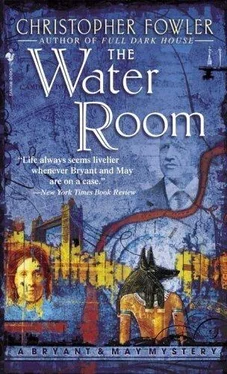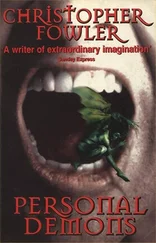Christopher Fowler - The Water Room
Здесь есть возможность читать онлайн «Christopher Fowler - The Water Room» весь текст электронной книги совершенно бесплатно (целиком полную версию без сокращений). В некоторых случаях можно слушать аудио, скачать через торрент в формате fb2 и присутствует краткое содержание. Год выпуска: 2006, Жанр: Детектив, на английском языке. Описание произведения, (предисловие) а так же отзывы посетителей доступны на портале библиотеки ЛибКат.
- Название:The Water Room
- Автор:
- Жанр:
- Год:2006
- ISBN:нет данных
- Рейтинг книги:5 / 5. Голосов: 1
-
Избранное:Добавить в избранное
- Отзывы:
-
Ваша оценка:
- 100
- 1
- 2
- 3
- 4
- 5
The Water Room: краткое содержание, описание и аннотация
Предлагаем к чтению аннотацию, описание, краткое содержание или предисловие (зависит от того, что написал сам автор книги «The Water Room»). Если вы не нашли необходимую информацию о книге — напишите в комментариях, мы постараемся отыскать её.
The Water Room — читать онлайн бесплатно полную книгу (весь текст) целиком
Ниже представлен текст книги, разбитый по страницам. Система сохранения места последней прочитанной страницы, позволяет с удобством читать онлайн бесплатно книгу «The Water Room», без необходимости каждый раз заново искать на чём Вы остановились. Поставьте закладку, и сможете в любой момент перейти на страницу, на которой закончили чтение.
Интервал:
Закладка:
‘Yes, and I suppose that’s what I’m here about, in a way. I’m sorry-’ He pulled a crumpled sheet of music from beneath his buttocks and searched for somewhere to put it.
‘That’s all right, we use the backs for shopping lists. Penniless artists often used to paint on the back of sheet music, did you know? There’s no reason why you should, of course. That’s the problem with running the local historical society-one is always telling people things they have absolutely no interest in hearing. The modern world has severed itself from its history, Mr Bryant. Only the wealthy can afford the luxury of remembering the past, and we are far from wealthy. What can I tell you about? I’m afraid we only cover the immediate area. Somers Town, St Pancras, Camden and King’s Cross have their own historical societies, but we’re all struggling. We’re short of members, and no one has enough free time to do the research.’
Bryant scratched the side of his nose and thought. ‘Well, it’s a bit of a long shot. There have been some strange occurrences in the surrounding streets. I’m required to examine every feasible possibility, and find myself trying to understand.’ He accepted a mug of orange tea and drank a trusting measure. ‘Searching for someone with motive and opportunity hardly seems to apply in this instance. Instead, I’ve been wondering if the solution lies in the actual ground itself.’
‘I’m not sure I follow you,’ Mrs Quinten admitted, seating herself opposite.
‘The area is a victim of its past. People have made their homes here for centuries, have lived and bred and fought and died here, around the river beds, in damp and squalor, in marshlands and on hills of bones. You can concrete over the land, but you can’t change its character without moving everyone out and replacing them all.’
‘But that’s precisely what is happening, Mr Bryant. In the last two decades, these streets have been filled with virtually every nationality on earth. The city’s character is rapidly changing, thanks to the advent of mass transit and economic migration.’
‘But migrants bring comparatively little of their hereditary culture with them,’ argued Bryant. ‘Recent experiments have shown the growing power of nurture over nature. The first law of behavioural genetics states that all human traits are inheritable, but a large proportion of those traits are unaccounted for by genes or families. Children spend less time with their parents, so they’re changed more by their peers. The city quickly imposes its own will. If you raised one identical twin in Istanbul and the other in London, you might doubt they were ever related by the time they were twenty.’
‘I’m sorry, Mr Bryant, you really are losing me.’
‘A murderer, Mrs Quinten!’ Bryant blurted. ‘I can’t make myself any plainer.’ Coming from Bryant, it sounded like an apology. ‘Three residents and one transient have died, while another is in hiding. An old Indian lady, a builder, a television producer, a homeless alcoholic. They have absolutely nothing in common with one another except their location. It leads me to assume that they were attacked not for who they were, but simply because they were here at all. I asked myself what was so special about this place, beyond the fact that it seems to suffer from a surfeit of water, then wondered if that was it. Water rising from below, falling from the sky, soaking into the walls of houses. But if that is the connection, what on earth does it mean? Which leads me to ask if you have anything in your historical records that reveals a precedent for such violent behaviour in the area. Has it happened before, perhaps the last time the streets flooded?’
‘Ah, I’m with you now,’ said Mrs Quinten finally. ‘Feel free to delve into the biscuit barrel while I go and look.’
She returned with an immense folder of newspaper cuttings, which she dropped on to the kitchen table in a cloud of fine dust.
‘Are you allergic? I hope not. This one has been on top of the wardrobe for years.’ She folded back the front cover, wiping it with her sleeve. ‘I think you’ll find that the same three roads around here have flooded every thirty years or so.’
‘When was the last time?’ Bryant unfolded his glasses and pinned back the clippings.
‘1975. Before that, 1942. Covering over the Fleet didn’t stop it from flooding. The council can’t do anything about it. They thought that drains added at the time of the new London ring-main would help, but there’s a gentleman in Balaklava Street who works for the Water Board, and he reckons it’s due to happen again.’
‘Oliver Wilton,’ said Bryant. ‘You know him?’
‘Yes, he belongs to our society. Gave a talk last year about the problem. He’s an expert on the subject. Very passionate about it. He has maps showing the exact patterns of flooding.’ She turned a page and pointed to an article taken from the Camden New Journal . ‘Here you are. Bayham Street, Archibald Road, Balaklava Street. Bayham Street was one of the poorest roads in the whole of London. Charles Dickens lodged there when he came up from Chatham. It was so wet that the weeds came up through the paving stones and split them clean in half.’
‘When was this?’
‘Around 1822. At one end of the street was the Red Cap tea garden, named after the local witch. A lot of people thought the place was haunted by her and her familiars. Old photographs show how grim and unlit the side streets were, and naturally there were many fights and murders in such a poverty-stricken area. Bayham Street is better than it was, but there are still muggings, car thefts, drug-dealing, and the odd murder, as I’m sure you know. Archibald Road went during the War, firebombed out of existence-all that’s there now is a car showroom and an estate agent’s office. There were sightings of ghosts there before the War, but it was a time when everyone seemed to see phantoms, almost as if they were having premonitions of the terrible times ahead. And there had been sensational cases widely reported, like the haunting of Borley Rectory, so strange sightings in local neighbourhoods made good press copy. Look.’ She tapped a nicotine-coloured photograph showing a brick flying through the air. ‘The Rectory hoax would fool no one today. Attention-seekers staged these ridiculous stunts, hysterical parlour maids saw ladies in white, old gentlemen swore they saw Cavaliers walk through walls. People can be so silly in times of social panic; how quickly they all start to agree with one another. Perhaps we should look at more recent events. This might interest you.’ She carefully emptied an envelope of cuttings and unfolded them. ‘A railway worker murdered his wife and children in Inkerman Street, no reason ever given-he died in a mental institution.’
‘Arrested in October 1975,’ said Bryant. ‘The time of the last flood. What about the previous occasion?’
‘I don’t think we have anything on that date, but there’s something from much earlier.’ She pulled a large volume bound in crimson leather, one of six, from the kitchen bookcase. ‘Walford’s Old and New London, probably the best set of reference books ever published on London. Here we are: “Ghastly murder at the Castle Tavern in 1815”. The route had long been popular with highwaymen travelling out of town through Hampstead. Dick Turpin had regularly held up the coaches using it. It would seem that this particular horseman threatened the tavern’s entire clientele, then began shooting them dead when they refused to hand over their money and jewellery. The interesting part comes afterwards, for he appears to have drowned during his escape. He attempted to cross the Fleet, but the river rose suddenly and cut him off in mid stream. The horse stumbled, throwing him into the fast-moving water. His body was never recovered.’
Читать дальшеИнтервал:
Закладка:
Похожие книги на «The Water Room»
Представляем Вашему вниманию похожие книги на «The Water Room» списком для выбора. Мы отобрали схожую по названию и смыслу литературу в надежде предоставить читателям больше вариантов отыскать новые, интересные, ещё непрочитанные произведения.
Обсуждение, отзывы о книге «The Water Room» и просто собственные мнения читателей. Оставьте ваши комментарии, напишите, что Вы думаете о произведении, его смысле или главных героях. Укажите что конкретно понравилось, а что нет, и почему Вы так считаете.












